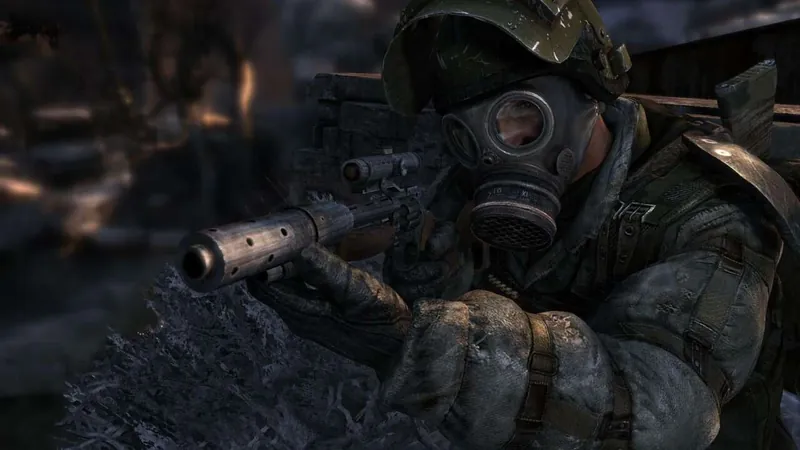
Celebrating 15 Years of Metro 2033: A Dark Reflection on Humanity and Violence
2025-03-16
Author: Ying
March 16, 2025, marks the 15th anniversary of the groundbreaking video game Metro 2033, a title that has continued to resonate with players due to its intricate portrayal of morality in a post-apocalyptic world. As we reflect on the game's legacy, we explore how its unique moral system encapsulates broader themes of humanity, violence, and the consequences of choices.
In many video games, villains often embody grand, exaggerated evil—a stark contrast that stirs excitement rather than contemplation. Titles like Baldur's Gate 3 and Knights of the Old Republic serve up epic confrontations with monstrous foes or corrupt power, almost reveling in the chaotic brutality of their narratives. Metro 2033, however, takes a different approach. Set in the aftermath of nuclear devastation, the game plunges players into the shadowy depths of the Moscow metro system, teeming with ruthless bandits, grotesque mutants, and oppressive forces. The bleakness of these encounters raises critical questions about the nature of violence and the incremental decisions that lead to atrocities.
At the heart of Metro 2033 lies its innovative moral system, which operates in a subtle, almost invisible manner. Instead of a clear indicator of moral points earned through actions, players experience a visceral feedback system: a sound effect combined with a flash of light when protagonist Artyom makes good choices, and an ominous counter when he succumbs to darker impulses. This mechanic removes the explicitness typically associated with morality in games, allowing players to feel the weight of their decisions without the distracting metrics often found elsewhere.
Artyom, who enters the narrative as a humble and naive character, is far from a hardened soldier. His journey begins with him receiving a grim task from his mentor, Hunter, a seasoned ranger, who warns him about the mysterious "Dark Ones." The journey that follows traverses not only the physical challenges of an irradiated world but also the moral quagmires that force him to confront his beliefs and choices.
In many ways, Metro 2033 diverges from the militaristic shooter archetype, offering players a chance to explore the deeper human experiences within its bleak settings. The game slows down in its quieter moments, allowing players to witness the daily lives of the metro's inhabitants, juxtaposed against the horrors lurking in the dark. Artyom's interactions—whether giving to beggars or engaging with fellow survivors—underscored the potential for kindness amidst chaos.
Moreover, the complexity of the game's economic system, where military-grade bullets serve as both currency and lethal necessity, further emphasizes the moral weight of Artyom’s choices. Scavenging for supplies and discovering long-forgotten caches contributes to a sense of survival that feels both personal and communal. Each decision, whether small or monumental, causes ripples in the narrative, allowing for multiple outcomes, unlike the rigid paths of many conventional military shooters.
The game's exploration of morality also raises parallels to real-world historical atrocities, notably the devastation of Hiroshima and Nagasaki. Much like the individual choices that brought together figures like Truman and Oppenheimer in the creation of the atomic bomb, Artyom’s fate hinges on his interactions with the "Dark Ones" and the choices he makes. The game suggests that caring intentions can coexist with destructive actions, a meditation on the complexity of human morality.
Visually, Metro 2033 stands apart with its atmospheric design—light is sparse and muted, the environment is laden with decay and despair, and each flashlight beam brings the ghosts of the past into sharp relief. The haunting ambiance deepens the emotional experience, enhancing Artyom's realization of the personal consequences of his journey.
In conclusion, as we celebrate the 15-year legacy of Metro 2033, it is clear that the game has left an indelible mark not just on the landscape of gaming, but also on the discourse surrounding violence, moral complexity, and the haunting nature of human decisions. It invites players to explore not just the physical remnants of a lost world but the shadowy realms of their own morality, making every choice feel impactful and profoundly human.



 Brasil (PT)
Brasil (PT)
 Canada (EN)
Canada (EN)
 Chile (ES)
Chile (ES)
 Česko (CS)
Česko (CS)
 대한민국 (KO)
대한민국 (KO)
 España (ES)
España (ES)
 France (FR)
France (FR)
 Hong Kong (EN)
Hong Kong (EN)
 Italia (IT)
Italia (IT)
 日本 (JA)
日本 (JA)
 Magyarország (HU)
Magyarország (HU)
 Norge (NO)
Norge (NO)
 Polska (PL)
Polska (PL)
 Schweiz (DE)
Schweiz (DE)
 Singapore (EN)
Singapore (EN)
 Sverige (SV)
Sverige (SV)
 Suomi (FI)
Suomi (FI)
 Türkiye (TR)
Türkiye (TR)
 الإمارات العربية المتحدة (AR)
الإمارات العربية المتحدة (AR)